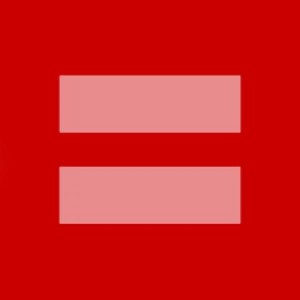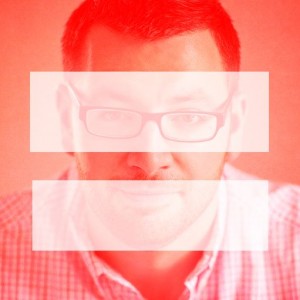Note: I first wrote this as an opinion piece for the Iowa City Press-Citizen in March 2013 when the red marriage equality avatars took Facebook by storm. With the fall of the Defense of Marriage Act (DOMA) this week, Facebook once again went red in support. It seemed timely to update this and repost it here, as it explores social media’s role in social change.
If you’re a social media user, you probably noticed that blue Facebook took on a decidedly red hue this past week. As the marriage equality debate closed in the US Supreme Court with the fall of DOMA, thousands of Facebook users worldwide – led by Star Trek helmsman and social media trendsetter George Takei – adopted a new avatar or profile picture.
 Not to be mistaken as a simple show of support for artist Mark Rothko, this popular avatar is a version of the equal sign logo used by the Human Rights Campaign (HRC) in shades of red, the universally accepted color of love. The movement began as the case kicked off last spring and re-emerged once again this week when the final decision came down.
Not to be mistaken as a simple show of support for artist Mark Rothko, this popular avatar is a version of the equal sign logo used by the Human Rights Campaign (HRC) in shades of red, the universally accepted color of love. The movement began as the case kicked off last spring and re-emerged once again this week when the final decision came down.
It wasn’t long before you saw this image modified and adapted to include pop-culture couples like Bert and Ernie, Peppermint Patty and Marcie, the Statue of Liberty embracing Lady Justice, Mitchell and Cam from Modern Family, and so on (a few of my favorites are shown above). These satirical adaptations further cemented the strength of the core concept. Moreover, brands such as Salesforce, Klout, and others got involved with their own variations on the avatar. (A quick aside — issues can be tricky for brands even as opinions evolve. The best guidance is to know your audience and engage appropriately.)
I have a confession to make. While it’s no secret that I’m personally a proponent of equality and a social media talking head to boot, I was late changing my avatar. More than any statement or lack there of, this was my inner “Larry David” misanthropic self emerging. When the movement began, I saw a few of these red avatars crop up before a series of daylong meetings. When I returned Facebook was crimson in support.
How can I possibly switch it now? When everyone sees this in my feed, will they think I just came about on the issue? On the other hand I want to show my support too …
Beyond my own over-thinking, all of this red on Facebook is sparking an even bigger debate among those in the media observing the movement — do all of these red avatars really matter? Avatar campaigns, where a brand asks followers to change their avatar on social media in support of an issue or cause, aren’t anything new. However, this one has taken off in a very big way.
 As a resident of Coralville, Iowa, I participate in the annual Aisle of Lights each December, putting out luminaries on the designated day to celebrate the holidays. Regardless of our schedules we always do this because it’s something we all do together. Communities have long gathered around shared symbols of awareness and support through candlelight vigils, armbands, and signs. Now, through social media, we can stand together as a community in solidarity around an issue online as well.
As a resident of Coralville, Iowa, I participate in the annual Aisle of Lights each December, putting out luminaries on the designated day to celebrate the holidays. Regardless of our schedules we always do this because it’s something we all do together. Communities have long gathered around shared symbols of awareness and support through candlelight vigils, armbands, and signs. Now, through social media, we can stand together as a community in solidarity around an issue online as well.
These iconic symbols are more than simple lip service, they show support, raise awareness, and start conversations. Among straight allies of marriage equality, it can be challenging to find an effective way to show where you stand and start a discussion with your circle of friends. Flying a visual flag like the red HRC avatar provides an easy ice-breaker for this dialogue. Why do conversations matter? Because they advance issues, especially among those who struggle to find their voice or to be heard.
The end result that I’m not certain anyone, even Mr. Sulu, could have predicted is what you saw when all of the avatars appeared together. Like that first look down our long street in Coralville with all of the luminaries lit, seeing your feed glow red as your friends stand up illustrates better than perhaps any data point or trend analysis that the momentum behind this issue is stronger than ever before.
When we stand together, we can’t be silenced. With tools like Facebook, we can now stand together from our couch, our desk at work, or our kid’s soccer games. We can make a stand from anywhere and sow seeds of support, solidarity, and social change.
And despite the concern of looking like I came late to the party, I’ve changed my avatar now, too.

